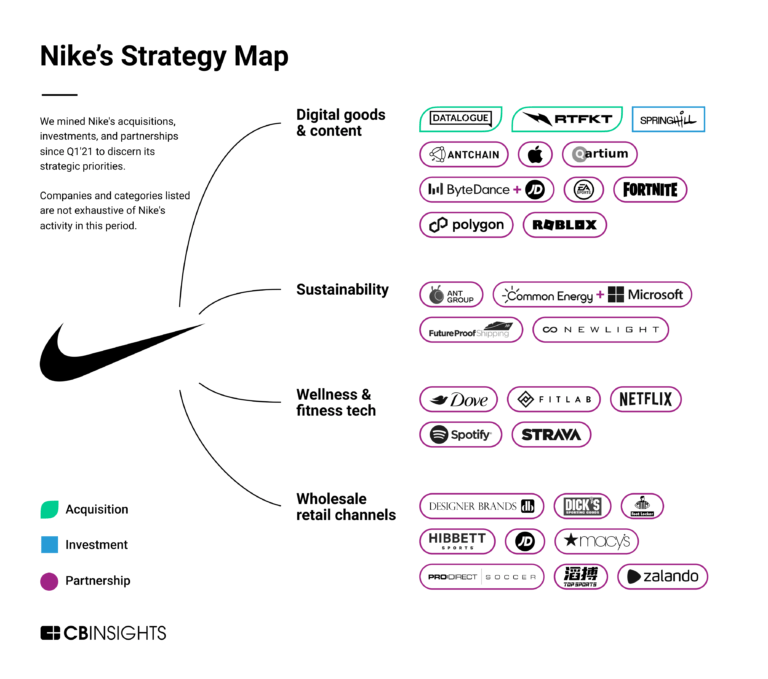
Strava
Founded Year
2009Stage
Debt | AliveTotal Raised
$179.85MValuation
$0000Revenue
$0000Mosaic Score The Mosaic Score is an algorithm that measures the overall financial health and market potential of private companies.
+157 points in the past 30 days
About Strava
Strava focuses on connecting athletes and providing tools for tracking and analyzing athletic activities in various sports sectors. The company offers an application and website that allow users to record activities, analyze performance data, and engage with a community of athletes. It caters to a range of sports, including running, cycling, hiking, and many others, with features that support activity tracking, social interaction, and event discovery. It was founded in 2009 and is based in San Francisco, California.
Loading...
ESPs containing Strava
The ESP matrix leverages data and analyst insight to identify and rank leading companies in a given technology landscape.
The fitness tracking apps market offers consumers a variety of solutions to track and monitor their physical activity, nutrition, and overall health. These apps use sensors on smartphones to collect data on steps taken, calories burned, heart rate, sleep patterns, and more. Companies in this market may also have a wearable, coaching platform, or exercise content. The data is then analyzed and pres…
Strava named as Outperformer among 11 other companies, including Nike, Samsung, and Garmin.
Loading...
Research containing Strava
Get data-driven expert analysis from the CB Insights Intelligence Unit.
CB Insights Intelligence Analysts have mentioned Strava in 1 CB Insights research brief, most recently on Feb 16, 2024.
Expert Collections containing Strava
Expert Collections are analyst-curated lists that highlight the companies you need to know in the most important technology spaces.
Strava is included in 3 Expert Collections, including Unicorns- Billion Dollar Startups.
Unicorns- Billion Dollar Startups
1,277 items
Wellness Tech
1,370 items
We define wellness tech as companies developing technology to help consumers improve their physical, mental, and social well-being. Companies in this collection play across a wide range of categories, including food and beverage, fitness, personal care, and corporate wellness.
Tech IPO Pipeline
257 items
The tech companies we think could hit the public markets next, according to CB Insights data.
Strava Patents
Strava has filed 23 patents.

Application Date | Grant Date | Title | Related Topics | Status |
|---|---|---|---|---|
3/5/2019 | 4/11/2023 | Global Positioning System, GPS navigation devices, IPhone, Diagrams, Wireless locating | Grant |
Application Date | 3/5/2019 |
|---|---|
Grant Date | 4/11/2023 |
Title | |
Related Topics | Global Positioning System, GPS navigation devices, IPhone, Diagrams, Wireless locating |
Status | Grant |
Latest Strava News
Jun 29, 2025
Comments Drawer I asked AI for insight into my health data. It gave me a regurgitated book report. Link Threads | Image: The Verge, Getty Images I asked AI for insight into my health data. It gave me a regurgitated book report. Link Threads Victoria Song is a senior reporter focusing on wearables, health tech, and more with 13 years of experience. Before coming to The Verge, she worked for Gizmodo and PC Magazine. After nearly a decade of wearables testing, I’ve amassed a truly terrifying amount of health and fitness data. And while I enjoy poring over my daily data, there’s one part I’ve come to loathe: AI summaries. Over the last two years, a deluge of AI-generated summaries has been sprinkled into every fitness, wellness, and wearable app. Strava introduced a feature called Athlete Intelligence , pitched as AI taking your raw workout data and relaying it to you in “plain English.” Whoop has Whoop Coach , an AI chatbot that gives you a “Daily Outlook” report summarizing the weather, your recent activity and recovery metrics, and workout suggestions. Oura added Oura Advisor , another chatbot that summarizes data and pulls out long-term trends. Even my bed greets me with summaries every morning of how its AI helped keep me asleep every night. Each platform’s AI has its nuances, but the typical morning summary goes a bit like this: Good morning! You slept 7 hours last night with a resting heart rate of 60 bpm. That’s in line with your weekly average, but your slightly elevated heart rate suggests you may not be fully recovered. If you feel tired, try going to bed earlier tonight. Health is all about balance! Related That might seem helpful, but those summaries are usually placed next to a chart with the same data. It’s worse for workouts. Here’s one that Strava’s Athlete Intelligence generated for a recent run: Intense run with high heart rate zones, pushing into anaerobic territory and logging a relative effort well above your typical range. Thanks? I can ask Athlete Intelligence to “say more,” but it regurgitates my effort, heart rate zone, and pace metrics I can see in graphs in the workout summary. If you didn’t know anything about my athletic history or the circumstances surrounding this run, this summary might read as insightful. Here’s what the summary left out: It was dangerous to triple my mileage in only my second run of the year, given the high humidity, 85-degree-plus weather, and my spotty workout history over the past two months compared to the six months before it. Strava has access to weather data and every workout I’ve done in the past five years. I had to cut this run short because I fell and shredded my hand and knees. This is information Strava has access to, as I uploaded a gnarly picture in addition to text notes. After adding said notes, the updated summary only reflected that I cut the run short. My injury changed nothing about its insights, even though it’s the most important thing that happened during this run. I don’t know guys, without Athlete Intelligence, would I have known my elevation gain was a modest 88ft? Screenshot: Strava A more helpful insight might’ve been: “You ran during record-breaking heat for your region. While you maintained a consistent and steady pace, you have a bad habit of ramping up mileage too quickly after prolonged breaks, leading to several self-reported injuries in the past five years. A safer alternative would be lower mileage runs over two weeks to acclimate to rising temperatures. Since you’re injured, stick to low-intensity walks until your wounds have healed.” Runna, a popular running app that also features AI insights, generated a slightly more useful summary. It said my next run should be “easy,” one that’s perfectly timed for me to recharge. I’m sorry, but 48 hours isn’t enough time for my knees to safely heal without risk of re-opening my wounds. The in-app chatbots aren’t much better. Yesterday morning, I asked Whoop Coach if I should run today because I injured myself on my last run. It told me: “Whoop is unable to reply to the message you sent. Please try sending a different message.” I tried reframing my prompt, saying, “I’m injured and have a limp. Generate a low-intensity workout alternative while I recover.” I was prompted to contact Whoop Membership Services to continue the conversation. Oura Advisor was more helpful, noting in my daily summary: “With your Readiness dipping and recent stressors like heat, an injury, and higher glucose, your body may feel more fatigued than usual today.” It suggested I prioritize rest. When asked, “What types of movement are okay when you have an injured knee and a slight limp?” it responded with common-sense answers like a short and easy walk if there’s no pain, light stretching, and a reminder to completely rest if I feel any sharp discomfort. This is closer to an ideal response, but I had to guide it to the type of answer I wanted. The insights are so general-purpose that they benefit self-quantification newbies — and even then, only if they’re allergic to googling. My botched run is exactly the type of scenario where tech CEOs say AI insights could be most useful. In theory, I agree! It would be nice to have a competent, built-in chatbot that I could ask more nuanced questions.
Strava Frequently Asked Questions (FAQ)
When was Strava founded?
Strava was founded in 2009.
Where is Strava's headquarters?
Strava's headquarters is located at 208 Utah Street, San Francisco.
What is Strava's latest funding round?
Strava's latest funding round is Debt.
How much did Strava raise?
Strava raised a total of $179.85M.
Who are the investors of Strava?
Investors of Strava include Sequoia Capital, Madrone Capital Partners, Jackson Square Ventures, Sequoia Capital, Technology Crossover Ventures and 5 more.
Who are Strava's competitors?
Competitors of Strava include Runna, Troopr, BreakAway Data, Sorius, IntelliSports and 7 more.
Loading...
Compare Strava to Competitors

MyFitnessPal is a digital health and fitness company that specializes in nutrition tracking. The company offers a comprehensive platform for tracking food intake, exercise, and calories, aimed at helping users achieve their health and fitness goals. MyFitnessPal provides a vast food database, personalized insights, and tools for habit building, such as a barcode scanner for easy food logging and device integration for tracking physical activity. It was founded in 2005 and is based in Austin, Texas.

aims to provide active individuals with the tools and community for their athletic pursuits. The MapMyFitness, LLC suite of websites offers community-based fitness content, tools, calculators, and mapping technologies. MapMyRun.com users are able to visualize their health and fitness training progress through the use of maps, workout logs, fitness calculators/tools, and user-led community groups.

Withings develops connected health technology in the health and wellness sector. The company offers product range includes smart scales, hybrid smartwatches, blood pressure monitors, and sleep analysis tools, which provide users with health measurements and insights. Its products are targeted at individuals who wish to monitor their health at home. The company was founded in 2008 and is based in Issy-les-Moulineaux, France.

TrainingPeaks provides endurance training solutions within the fitness and sports industry. The company offers web and mobile applications for athletes to set goals, structure their training, and monitor their progress. TrainingPeaks serves various athletes, including runners, cyclists, and triathletes, as well as coaches focused on training and performance analysis. It is based in Boulder, Colorado.

Whoop produces wearable health technology within the fitness and health sectors. It offers a fitness tracker that monitors sleep, heart rate variability, resting heart rate, and physical strain. Whoop was formerly known as Bobo Analytics. It was founded in 2012 and is based in Boston, Massachusetts.

Zwift focuses on applications for indoor cycling with smart trainers and bikes. The company provides a virtual environment where users can participate in workouts, group rides, and online racing events. Zwift serves the fitness and cycling community with its interactive approach to training. It was founded in 2014 and is based in Long Beach, California.
Loading...

